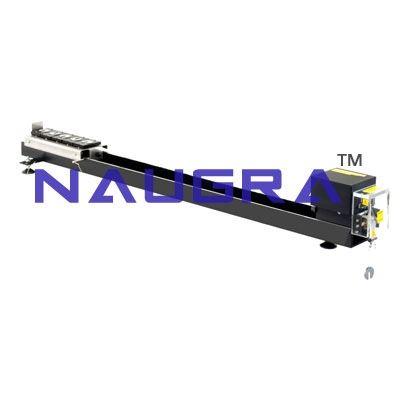- Civil Lab Mechanical Lab Engineering Lab Equipments
- sales@didacticlabequipments.com

CAT NO: DIDACTICNLE-Export-056020
Acceleration Apparatus Engineering Lab Training Systems.
Features
Self-contained
Bench mounted
Novel gliding design
Total mass of moving system can be kept constant for different acceleration masses
Acceleration determination by spark generator and electro-sensitive paper
Confirmation of Newton's Second Law
of Motion
Determination of gravitational acceleration
Three year warranty
Range of Experiments
To show that a force causes a mass to accelerate, and that the acceleration is proportional to the force
To compare experimental and theoretical values of forces required to accelerate a given mass
To determine the acceleration due to gravity, g
Description
This
type of equipment has been used for many years to introduce students to
accelerated linear motion, in particular the dependence of the
acceleration on the net force causing the motion. Confirmation of
Newton's second law of motion and the determination of gravitational
acceleration are possible.
The trolley which carries five removable masses glides on two rails attached to the base.
Electro-sensitive
paper strip attached to the trolley passes through a spark generator
which produces five impulses per second, enabling the trolley
acceleration to be accurately determined.
The weights which produce the accelerating force are hung directly onto the paper strip.
All required equipment is supplied. Further rolls of electro-sensitive paper are available.
This
equipment is part of a range designed to both demonstrate and
experimentally confirm basic engineering principles. Great care has been
given to each item so as to provide wide experimental scope without
unduly complicating or compromising the design. Each piece of apparatus
is self-contained and compact. Setting up time is minimal, and all
measurements are made with the simplest possible instrumentation, so
that the student involvement is purely with the engineering principles
being taught. A complete instruction manual is provided describing the
apparatus, its application, experimental procedure and typical test
results
